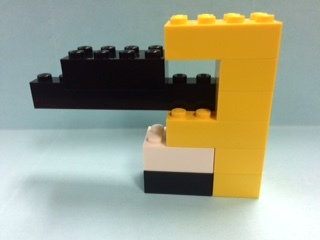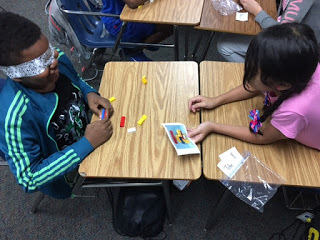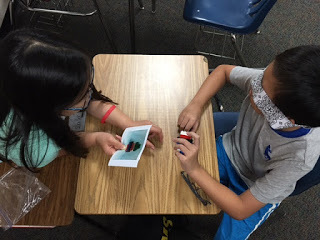David Sebek's Blog
September 6, 2016
Six Outstanding Speakers in One Afternoon
 Somehow I got myself invited to speak at Ian Byrd's Hatch Event in October. Which is kind of awesome because I get to hang out with Ian and Lisa Van Gemert and Nicole Shannon and also get to meet some new people like Daniel Brillhart and Whitley Rubinson.
Somehow I got myself invited to speak at Ian Byrd's Hatch Event in October. Which is kind of awesome because I get to hang out with Ian and Lisa Van Gemert and Nicole Shannon and also get to meet some new people like Daniel Brillhart and Whitley Rubinson.The other exciting part is I get to talk about something I am very passionate about and that is how our stories can help us deal with fear, failure and finding fulfillment. Man do I love alliteration!
Here are the details on the event:
Hatch: Austin
October 8th, 2016
12:30 - 4:30
The Hotel Van Zandt
Lifelong Success for Students
Tickets available at byrdseed.com/hatch or for purchase orders and group tickets, contact ian@byrdseed.com
Published on September 06, 2016 15:39
August 24, 2016
Using an Escape Game to Experience the Value of Partner Work
One of my students said that I was like a therapist because I was helping her express her frustration with group work. She bore many deep scars from projects that required her to spend more time trying to engage her teammates in the assignment rather than doing their part to complete the assignment.
I get it. It seems every group project can be expressed succinctly with this Hangover meme.

From our conversations in class, apparently every student I teach is Bradley Cooper in this situation. I have a feeling there is a bit of revisionist history and knowing the intensities of my gifted and talented students, they may have brought on some of the lackadaisical efforts of their teammates by judging their team's work through their own personal perfectionist lens.
How do we create situations that invite students back to the collaborative process so that students feel that working together can make us all better citizens?
Working with a team or a partner can be a very rewarding experience, and I have found in my consulting work and in my new enterprise of designing escape rooms, that teamwork and collaboration are a vital skill for survival in our ever changing world.
Recently I visited an escape room that required two people to complete a puzzle: one person could see the pieces and the other person could move the pieces. But no one person could do both.
I loved the game dynamic and the rush I felt with my partner when we completed the puzzle. I wanted to bring the game to my classroom but did not have the time to recreate 15 versions of this intricate wooden puzzle. Luckily my campus bought thousands of Lego's a few years ago.
First I created some structures using a variety of colors. Then I took pictures of the structures and printed them out and glued them to note cards.


When students came into class I split them into pairs. I gave one student a blindfold and the necessary bricks for their assigned structure. The other partner received the picture directions.
The blindfolded student is the only one who is allowed to touch the bricks. The sighted partner must direct them to select the bricks and then give them the instructions required to build the correct structure.


I usually set the timer for about 25 minutes. This is enough time for the students to work through three to four structures, taking turns with the blindfold.
When we are done, I ask the students a number of follow-up reflections questions to see what they value about working with a partner.
Student responses have included:
You get better ideas when you work together
Double the smartness
Build on strengths
Get more stuff done
Someone who has your back
Classroom atmosphere is lighter
Get to know new people
Someone to help you when you don't know what to do
This is not a cure all for students who resent working with others but it does begin to guide the conversation in the right direction.
I like this work because the cognitive load is on the teamwork and communication and not on the content. It is too hard teaching new processes with new content. Any time I try to introduce a new process, I make sure the concepts are well known so that students are not splitting their mental powers between learning content and a new process.
One other responsibility of the teacher of course is to make sure that group or partner assignments truly require the strengths of everyone in the group. Many times I have seen and created assignments that require students to basically work in parallel, trying to merge competing visions of the project together. The conflict that arises from such assignments forces some students to dominate to finish the work and others to check out to avoid the stress of the conflict, crushing their vision.
If your students are not happy with group work, back up and invite them into the process with some Lego's and blindfolds.
Other observations from watching students work through this process:
They make revisions on the fly
They have to work on specificity of directions
They have to prioritize the work flow
They practice using their spatial awareness
They have to learn how to overcome short term frustrations
They have to transpose their directions (right becomes left, left becomes right)
I get it. It seems every group project can be expressed succinctly with this Hangover meme.

From our conversations in class, apparently every student I teach is Bradley Cooper in this situation. I have a feeling there is a bit of revisionist history and knowing the intensities of my gifted and talented students, they may have brought on some of the lackadaisical efforts of their teammates by judging their team's work through their own personal perfectionist lens.
How do we create situations that invite students back to the collaborative process so that students feel that working together can make us all better citizens?
Working with a team or a partner can be a very rewarding experience, and I have found in my consulting work and in my new enterprise of designing escape rooms, that teamwork and collaboration are a vital skill for survival in our ever changing world.
Recently I visited an escape room that required two people to complete a puzzle: one person could see the pieces and the other person could move the pieces. But no one person could do both.
I loved the game dynamic and the rush I felt with my partner when we completed the puzzle. I wanted to bring the game to my classroom but did not have the time to recreate 15 versions of this intricate wooden puzzle. Luckily my campus bought thousands of Lego's a few years ago.
First I created some structures using a variety of colors. Then I took pictures of the structures and printed them out and glued them to note cards.


When students came into class I split them into pairs. I gave one student a blindfold and the necessary bricks for their assigned structure. The other partner received the picture directions.
The blindfolded student is the only one who is allowed to touch the bricks. The sighted partner must direct them to select the bricks and then give them the instructions required to build the correct structure.


I usually set the timer for about 25 minutes. This is enough time for the students to work through three to four structures, taking turns with the blindfold.
When we are done, I ask the students a number of follow-up reflections questions to see what they value about working with a partner.
Student responses have included:
You get better ideas when you work together
Double the smartness
Build on strengths
Get more stuff done
Someone who has your back
Classroom atmosphere is lighter
Get to know new people
Someone to help you when you don't know what to do
This is not a cure all for students who resent working with others but it does begin to guide the conversation in the right direction.
I like this work because the cognitive load is on the teamwork and communication and not on the content. It is too hard teaching new processes with new content. Any time I try to introduce a new process, I make sure the concepts are well known so that students are not splitting their mental powers between learning content and a new process.
One other responsibility of the teacher of course is to make sure that group or partner assignments truly require the strengths of everyone in the group. Many times I have seen and created assignments that require students to basically work in parallel, trying to merge competing visions of the project together. The conflict that arises from such assignments forces some students to dominate to finish the work and others to check out to avoid the stress of the conflict, crushing their vision.
If your students are not happy with group work, back up and invite them into the process with some Lego's and blindfolds.
Other observations from watching students work through this process:
They make revisions on the fly
They have to work on specificity of directions
They have to prioritize the work flow
They practice using their spatial awareness
They have to learn how to overcome short term frustrations
They have to transpose their directions (right becomes left, left becomes right)
Published on August 24, 2016 10:20
August 20, 2016
October 3, 2015
Are We Really Learning What We Need To Know In Kindergarten?
I don't remember much about being five or being in Kindergarten. I think that might be okay because, more than likely, it was a positive experience. What do you remember about Kindergarten?
What I do remember about teaching Kindergarten is that I was often sad and frustrated with learning objectives that were inappropriate for my students developmental window. That arbitrary standards were created, seemingly without understanding of how children grow and learn at early ages.
Now I work with sixth graders and some teachers and parents get frustrated because they are unorganized or lack focus or seem to be walking in a daze.
Of course they are.
Especially the boys.
They are adolescent, hormonal hurricanes swirling through a sea of social anxieties and pressures.
You will have to excuse them if adding fractions is low on their priority list today because (insert cute boy or girl here) may have looked at them in the hallway and it was just after PE and they are not sure, but their shirt might be on inside out and backwards because the coach rushed them out of the locker room.
 The Joyful, Illiterate Kindergartners of FinlandWhat I think is being lost in the grand scheme of the education debates over standards and Common Core is the basic development of a human being. Somewhere along the lines education became more important than learning. Curriculum became more important than exploration. A number became more important than development.
The Joyful, Illiterate Kindergartners of FinlandWhat I think is being lost in the grand scheme of the education debates over standards and Common Core is the basic development of a human being. Somewhere along the lines education became more important than learning. Curriculum became more important than exploration. A number became more important than development.
I am not going to hyperbolize the amazing educational events happening in other countries (I don't see Finland and Japan threatening to build walls to keep out immigrants). There are examples from Finland and Japan and even in some schools in the United States that believe helping students learn is more important than educating them.
I hope this is where our collective pedagogy returns. It's not about the curriculum or the standards or the test, it's about the students sitting in front of us and helping them develop their passion and excitement for this incredible magical miracle we call living.
What I do remember about teaching Kindergarten is that I was often sad and frustrated with learning objectives that were inappropriate for my students developmental window. That arbitrary standards were created, seemingly without understanding of how children grow and learn at early ages.
Now I work with sixth graders and some teachers and parents get frustrated because they are unorganized or lack focus or seem to be walking in a daze.
Of course they are.
Especially the boys.
They are adolescent, hormonal hurricanes swirling through a sea of social anxieties and pressures.
You will have to excuse them if adding fractions is low on their priority list today because (insert cute boy or girl here) may have looked at them in the hallway and it was just after PE and they are not sure, but their shirt might be on inside out and backwards because the coach rushed them out of the locker room.
 The Joyful, Illiterate Kindergartners of FinlandWhat I think is being lost in the grand scheme of the education debates over standards and Common Core is the basic development of a human being. Somewhere along the lines education became more important than learning. Curriculum became more important than exploration. A number became more important than development.
The Joyful, Illiterate Kindergartners of FinlandWhat I think is being lost in the grand scheme of the education debates over standards and Common Core is the basic development of a human being. Somewhere along the lines education became more important than learning. Curriculum became more important than exploration. A number became more important than development.I am not going to hyperbolize the amazing educational events happening in other countries (I don't see Finland and Japan threatening to build walls to keep out immigrants). There are examples from Finland and Japan and even in some schools in the United States that believe helping students learn is more important than educating them.
I hope this is where our collective pedagogy returns. It's not about the curriculum or the standards or the test, it's about the students sitting in front of us and helping them develop their passion and excitement for this incredible magical miracle we call living.
Published on October 03, 2015 07:35
August 8, 2015
The Graveyard Book - A Book Review
 The Graveyard Book by Neil Gaiman
The Graveyard Book by Neil GaimanMy rating: 5 of 5 stars
It begins with a murder, a race through the night and help from the unlikeliest of sources. Little Nobody "Bod" Owens, orphaned and alone, is taken in by the ghosts of the neighborhood cemetery and protected from the evil Jack's that hunt for him.
For over a decade, the ghosts protect and raise Bod, as he explores and plays and discovers ancient places deep within the earth.
Over time he makes friends, goes to school, is abducted by demons and eventually faces the forces that initially tried to kill him as a toddler. Neil Gaiman creates a magical world that will resonate with readers as they watch grow up in the loving, vaporous arms of his ghost family.
View all my reviews
Published on August 08, 2015 12:27
Whispered Screams - Book Review
 Whispered Screams by Richard Fringe
Whispered Screams by Richard FringeMy rating: 5 of 5 stars
Very creepy and well paced tales of suspense. All four stories explore the darker side of good intentions and what happens when we blindly follow those we trust into the shadows of human nature. These stories will not be forgotten soon, even though I might want to before it is time to go to bed.
View all my reviews
Published on August 08, 2015 10:52
August 1, 2015
Finders Keepers - Book Review
 Finders Keepers by Stephen King
Finders Keepers by Stephen KingMy rating: 3 of 5 stars
This story is not a sequel to Mr. Mercedes. It runs parallel to the world created in the first Bill Hodges novel. You could read this novel without reading Mr. Mercedes because the first half of this novel begins with a new crime and a new set of characters. Hodges and his merry band of investigators do not show up until the end of Act II and then play a predominate role in Act III. Which is what makes this novel a bit of a head-scratcher.
The initial crime (a famous writer murdered and his secret novels stolen) and the serendipitous discovery of the stolen work by a 13 year old whose family is on tough times is an interesting hook. The story really gets rolling when Morris Bellamy, the criminal, comes after Pete Saubers, the lucky treasure hunter. Unfortunately Hodges connection to the crime is tenuous at best and outright forced at worst. It seems King might have had a great idea for a novella and then forced in Hodges and Mr. Mercedes in order to connect to a larger story arc.
Also there a moments of this novel that seem repetitious from other King novels. While Bellamy is in jail for an unrelated crime you find King plagiarizing himself as some of the prison scenes seemed to be lifted right our of his novella "Rita Hayworth and the Shawshank Redemption."
The highlight of the novel is the teaser peaks into what should be an interesting conclusion to this series as Hodges begins to find evidence that the mentally injured Brady Hartfield (Mr. Mercedes) may not be as damaged as diagnosed, and worse, he may have picked up some telepathic powers along the way.
End of Watch will finish this series and hopefully we will see a more cohesive story that ties together all of the important characters of the first two novels in a more meaningful way.
View all my reviews
Published on August 01, 2015 10:40
July 18, 2015
The Goldfinch - Book Review
 The Goldfinch by Donna Tartt
The Goldfinch by Donna TarttMy rating: 5 of 5 stars
The writer's job is to go out into the world, record what they can and then do their best to share it with the reader. Tartt does a wonderful job of taking her audience into the world of art crimes, loss, furniture restoration, drug addiction, mistaken love and redemption.
Theo, the protagonist, spends much of the novel trying to put back the pieces of his life that were blown apart by a terrorists bomb. The cast of characters are never flat, they live in a world Tartt has worked hard to give three dimensions. The reader will appreciate the time and craft she gives to making each character someone you cheer for or against.
It is a book that I could not put down and found to be engaging from the first page to the last.
View all my reviews
Published on July 18, 2015 10:26
The Light Between Oceans - Book Review
 The Light Between Oceans by M.L. Stedman
The Light Between Oceans by M.L. StedmanMy rating: 5 of 5 stars
We make hundreds of decisions everyday. Our morals and ethics guide us, the voice of our conscience. But sometimes we travel down a dark path when we make the wrong decisions for the right reasons. That is the heart of the moral and ethical dilemna in The Light Between Oceans.
The uniqueness of this novel comes from the creation of sympathetic characters by author M.L. Stedman. As the story unfolds, Tom and Isabel Sherbourne, shattered by war and three miscarriages, are given a miraculous gift from the waves of the ocean. Their decisions from that point on lead to a heart wrenching story that will haunt you long after you close the book.
Sometimes there are no right answers.
View all my reviews
Published on July 18, 2015 10:25
Navigating Early - Book Review
 Navigating Early by Clare Vanderpool
Navigating Early by Clare VanderpoolMy rating: 5 of 5 stars
Vanderpool creates an updated version of Tom Sawyer and Huck Finn. Updating the story to take in the special bond between two boys lost in a Maine military school due to deaths in the family.
Early Auden and Jack Baker form an unlikely friendship after Jack's military father drops Jack off in the Maine woods after Jack's mother dies. Amidst the rigor and structure of military school Jack is drawn to Early, a boy who is allowed to live outside the military routine. Soon Jack and Early are on their way, in search of a monster bear terrorizing the towns around the school.
Their journey forces them to confront pirates, slavery, and the losses that torture them both. Vanderpool creates memorable characters that make us which we were twelve again so that we could travel with them down the river, experiencing the world with awe and wonder.
View all my reviews
Published on July 18, 2015 10:23



